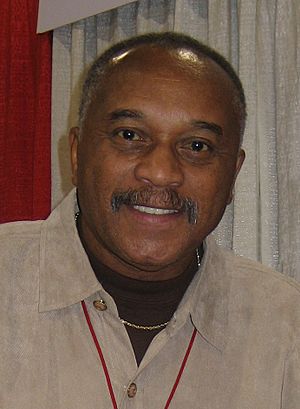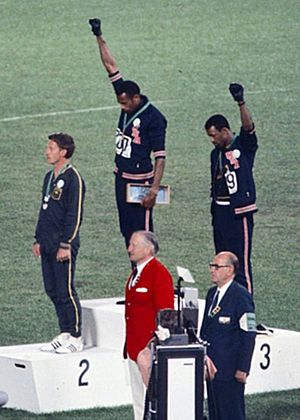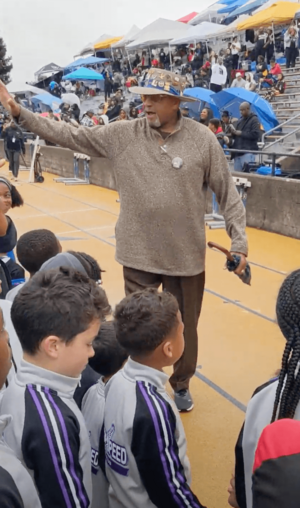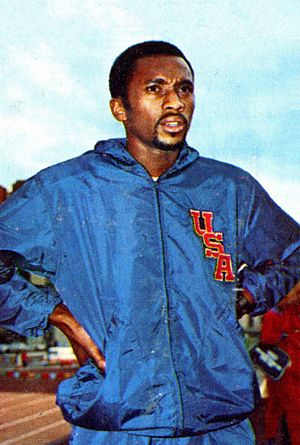Tommie Smith facts for kids

Smith in 2009
|
|||||||||||||||||||||||
| Personal information | |||||||||||||||||||||||
|---|---|---|---|---|---|---|---|---|---|---|---|---|---|---|---|---|---|---|---|---|---|---|---|
| Nationality | American | ||||||||||||||||||||||
| Born | June 6, 1944 Clarksville, Texas, U.S. |
||||||||||||||||||||||
| Height | 6 ft 3 in (1.91 m) | ||||||||||||||||||||||
| Weight | 185 lb (84 kg) | ||||||||||||||||||||||
|
Football career |
|||||||||||||||||||||||
| No. 24 | |||||||||||||||||||||||
| Position: | Wide receiver | ||||||||||||||||||||||
| Personal information | |||||||||||||||||||||||
| Height: | 6 ft 3 in (1.91 m) | ||||||||||||||||||||||
| Weight: | 190 lb (86 kg) | ||||||||||||||||||||||
| Career information | |||||||||||||||||||||||
| High school: | Lemoore (CA) | ||||||||||||||||||||||
| College: | San Jose State | ||||||||||||||||||||||
| NFL Draft: | 1967 / Round: 9 / Pick: 226 | ||||||||||||||||||||||
| Career history | |||||||||||||||||||||||
|
|||||||||||||||||||||||
| Player stats at PFR | |||||||||||||||||||||||
| Sport | |||||||||||||||||||||||
| Sport | Track and field | ||||||||||||||||||||||
| Event(s) | Sprints | ||||||||||||||||||||||
| College team | San Jose State Spartans | ||||||||||||||||||||||
| Club | Santa Clara Valley Youth Village | ||||||||||||||||||||||
| Achievements and titles | |||||||||||||||||||||||
| Personal best(s) | |||||||||||||||||||||||
|
Medal record
|
|||||||||||||||||||||||
Tommie C. Smith (born June 6, 1944) is an American athlete. He was a champion in track and field and also played American football. At the 1968 Summer Olympics, Tommie Smith won a gold medal. He set a new world record in the 200-meter sprint.
During the medal ceremony, Smith and fellow athlete John Carlos raised their fists. This action was a protest against unfairness and a symbol of the Black Power movement. It became a very famous moment in sports history.
Contents
Early Life and Sports Beginnings
Tommie Smith was born on June 6, 1944, in Clarksville, Texas. He was one of twelve children. Even though he was sick as a child, he grew up to be a strong athlete.
High School Achievements
While at Lemoore High School in California, Smith was amazing at sports. He set many school records in track. He won the 440-yard dash in a big state competition in 1963. His school voted him "Most Valuable Athlete" in basketball, football, and track. He also became vice president of his senior class. These achievements helped him get a scholarship to San José State University.
Setting World Records
At San Jose State, Smith continued to break records. On May 7, 1966, he ran the 200 meters in 19.5 seconds. This was a world best time. This record stood for over 44 years!
A few weeks later, on June 11, 1966, Smith became the first person to run 200 meters around a curve in 20.0 seconds. He then won the national college championship. In 1967, he won more national titles. He also won a gold medal at the 1967 Summer Universiade in Japan. By 1968, he was ready for the Olympics.
The 1968 Summer Olympics

Before the Olympics, Smith's teammate John Carlos actually beat Smith's world record. However, Carlos's record was not officially counted because of the special shoes he wore.
Standing Up for Human Rights
Tommie Smith was part of the Olympic Project for Human Rights (OPHR). This group wanted to bring attention to unfair treatment. Smith first suggested that athletes should not go to the Olympics. This was to protest issues like the unfair removal of Muhammad Ali's boxing title. They also wanted more African-American coaches.
When the boycott did not happen, Smith and Carlos decided to protest in another way. They wore black socks without shoes to show poverty. They wore beads to protest violence against people. They also wore OPHR buttons to show their support for human rights.
The Historic Race
At the 1968 Olympics in Mexico, Smith had a groin injury. But he still ran in the 200-meter final. His teammate Carlos started very fast. Smith had a slow start but then sped past Carlos. He was so far ahead that he raised his arms to celebrate before the finish line!
Smith won the race in 19.83 seconds. This was a new world record. It was also one of the first world records timed automatically.
The Podium Protest
After winning, Carlos and Smith made headlines around the world. They raised their black-gloved fists during the medal ceremony. This was a powerful symbol of protest. They wore black socks and no shoes to represent the struggles faced by African Americans.
Peter Norman, the silver medalist from Australia, supported them. He wore an OPHR badge on his uniform.
Consequences of the Protest
The head of the International Olympic Committee (IOC), Avery Brundage, did not approve. He said the protest was a political statement and not right for the Olympics. He ordered Smith and Carlos to be removed from the U.S. team. When the U.S. Olympic Committee did not agree at first, Brundage threatened to ban the entire U.S. track team. This led to Smith and Carlos being sent home from the Games.
A spokesman for the IOC called their actions "a deliberate and violent breach of the fundamental principles of the Olympic spirit." It's interesting to note that Brundage had not objected to Nazi salutes at the 1936 Berlin Olympics. He argued that the Nazi salute was a national salute, while Smith and Carlos's protest was not.
Smith and Carlos faced difficulties after their protest. They received threats against their lives and families. They also faced financial hardship. Peter Norman's career in Australia also suffered because of his support.
Smith later explained their reasons. He said, "We were concerned about the lack of black assistant coaches. About how Muhammad Ali got stripped of his title. About the lack of access to good housing and our kids not being able to attend the top colleges."
Later Career and Recognition
Tommie Smith set seven individual world records during his track career. He was also part of several world-record relay teams at San Jose State.
Football Career
Smith was drafted by the National Football League's Los Angeles Rams in 1967. He later signed to play for the American Football League's Cincinnati Bengals. He was a wide receiver for three seasons. In 1969, he played in two games and caught one pass for 41 yards.
Education and Teaching
A year after his Olympic win, Smith finished his college degree. He earned a master's degree in Social Change. This allowed him to combine his teaching and writing with his studies.
After his sports careers, he became a track coach at Oberlin College in Ohio. He also taught sociology there. Until 2005, he taught physical education at Santa Monica College in California.
Awards and Honors
Smith has received many honors for his achievements.
- In 1978, he was inducted into the United States National Track and Field Hall of Fame.
- In 1996, he was inducted into the California Black Sports Hall of Fame.
- In 1999, he received the Sportsman of the Millennium Award from that organization.
- In 2000 and 2001, he received awards from Los Angeles County and the State of Texas.
- In 2013, Goddard College honored Smith with the Presidential Award for Activism.
- In 2008, he and John Carlos received the Arthur Ashe Award for Courage.
- In 2018, Smith received the Dresden Peace Prize.
- In 2020, he received the President's Award from World Athletics Awards.
Public Recognition
Tommie Smith is featured in a 1999 documentary called Fists of Freedom: The Story of the '68 Summer Games. In the film, Smith explains his actions: "We were not Antichrists. We were just human beings who saw a need to bring attention to the inequality in our country. I don't like the idea of people looking at it as negative. There was nothing but a raised fist in the air and a bowed head, acknowledging the American flag – not symbolizing a hatred for it."
A sports hall in France was named after him in 2004. In 2005, a statue called Victory Salute was built at San Jose State University. It shows Smith and Carlos on the medal stand. The spot for Peter Norman's silver medal was left empty. This allows visitors to stand there and show their support, just as Norman did.
A large mural of the famous photo of Smith, Carlos, and Norman is painted on a wall in Australia. It is called "Three Proud People Mexico 68." This mural was protected in 2012 to make sure it would not be torn down. Smith and Carlos were even pallbearers at Norman's funeral in 2006.
The Tommie Smith Youth Track Meet is held every year in his honor. It is a big event for young athletes.
San Jose State University is building a new track and field complex. It will include the Speed City Legacy Center. This center will honor SJSU's famous track stars and civil rights leaders.
Books by Tommie Smith
Tommie Smith has written two books.
- His autobiography, Silent Gesture, was published in 2007. It tells his life story.
- His second book, Victory. Stand! Raising My Fist for Justice, was published in 2022. This is a graphic novel, which means it tells the story with pictures. It won several awards for young people's literature.
Personal Life
Tommie Smith has been married three times. He has five children. He first married Jimi Denise Paschal in 1967. They had one child. He then married Denise M. Kyle in 1977 and they had four children. In 2000, he married Delois Jordan.
See also
 In Spanish: Tommie Smith para niños
In Spanish: Tommie Smith para niños
- Timeline of the civil rights movement
- Bay Area Sports Hall of Fame
- Men's 200 metres world record progression
 | Valerie Thomas |
 | Frederick McKinley Jones |
 | George Edward Alcorn Jr. |
 | Thomas Mensah |



